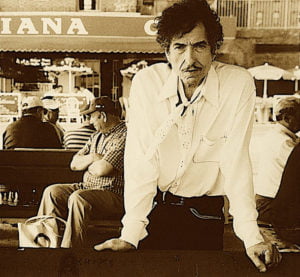
In the first verse Dylan begins with a simple statement of his intention to pursue his faith in his muse, combined with clear intimations of mortality which seem to motivate him. From the beginning the use of the pronoun ‘we’ involves the listener intimately in this process. …Every step of the way, we walk the line… he sings, echoing Johnny Cash’s I Walk The Line, that powerful statement of the intention to remain faithful which is so pronounced in its intensity to be ‘true’ that we begin to doubt whether the singer can truly remain on this path. The effect here is similar, especially as we are instantly cast into the arena of self-doubt: …your days are numbered/And so are mine…. This line, with its admission of the effect of the ageing process, echoes Dylan’s own …every hair is numbered/ like every grain of sand… , with its fatalistic overtones. The next few, wonderfully compressed, lines add to the effect – the singer is telling us that we are trapped by fate, our spirits confined by the constraints of time and age: …Time is piling up/We struggle and we scrape/All boxed in/Nowhere to escape… These lines eloquently express what so many people feel when they reach middle age. Our past histories ‘pile up’ on us, creating a kind of prison of the mind for ourselves. The line ‘struggle and scrape’ uses the ‘s’ alliteration that recurs throughout the song, most notably in the ‘hissing’ sound of the title word itself. The next lines begin to explore the classic blues dichotomy between city and countryside, which here takes on a symbolic dimension. The city is seen as a ‘jungle’ in which both singer and audience are trapped, continually trying to escape from. The ‘country’ which the singer was ‘raised’ seems in comparison to be a place of freedom, of inspiration and the singer tells us, in a wonderfully resonant phrase (again using the ‘s’ alliteration) that his problems have come from him becoming trapped in the ‘city’: …I’ve been in trouble since I set my suitcase down…

The nature of the spiritual and inspirational crisis that Dylan describes is deepened in the next lines, which again resonate powerfully with some of his own previous lyrics: ..Ain’t got nothin’ for you/ Had nothin’ before/ Don’t even have anything for myself anymore… Again the expression is clipped, terse, and very world-weary. In Like A Rolling Stone the cry of …When you ain’t got nothin’, You got nothin’ to lose… had been triumphant, symbolising how young people were shaking off the shackles of older kinds of morality. In contrast, in the later Too Much Of Nothing Dylan warns of the dangers of throwing off received wisdom, suggesting that such actions lead to…the waters of oblivion….
Here Dylan seems – as he will suggest in more detail later in the song – that he is drowning in those waters. The next lines intensify this effect – sliding from the poetic into the colloquial with a resigned grace: …Sky full of fire/pain falling down… is another skilfully compressed couplet. It is ‘pain’ that is ‘falling down’ from the sky, not ‘rain’- though of course, the sky itself is on fire. The singer’s suppressed, fiery anger turns into the cynicism of …There’s nothing you can sell me/I’ll see you around… the cursory brush-off of ‘I’ll see you around’ suggesting that he is trapped in an inspirational void. This sense of a lack of inspiration is made explicit in the following …My powers of expression and thoughts so sublime/ Could never do you justice/ In reason or rhyme… Here the singer decries his own poetic abilities before leading us into the first refrain of …Only one thing I did wrong/ Stayed in Mississippi a day too long… Clearly ‘Mississippi’ is the place where he feels trapped. The suggestion seems to be that his inspirational crisis has been caused by hesitancy, a fear of ‘moving on’ from one ‘state’ to another, perhaps in this case from youth to middle age, or from one mindset to another. In any case, a great ‘rolling river’ seems to yawn between the narrator and the freedom to be inspired that he so desires. Here the ‘state of Mississippi’ symbolises ‘the state of the blues’ that the singer finds himself in. The Mississippi Delta is generally referred to as ‘the cradle of the blues’. So the singer regrets that he has let himself ‘drown in his own tears’ for just a little too long.

In the second verse the singer seems to fade away from us, as if he is a kind of ghost. Again symbolism is contrasted with rather cynically colloquial phrases. We begin with some quintessential blues imagery indicating the singer’s mind set: …The devil’s in the alley/ Mule’s in the stall… he mutters, before further indicating his world-weariness: …Say anything you wanna/ I have heard it all… He seems distracted now, making a few mysterious references to wishing he was …in Rosie’s bed… He tells us he feels like an invisble ‘stranger’ and sounds lost, dejected… So many things we never may undo… and, rather pitifully, …you say you’re sorry, I’m sorry too… He seems lost in a kind of existential despair. …I need something strong… he darkly hints …to distract my mind… hinting at some potential plunge into ‘substance abuse’. He declares that he was guided towards the subject of the song by some cosmic or heavenly force, stating that …I got here following that Southern Star/ I crossed that river just to be where you are… In Version One, Dylan performs this verse with a kind of resigned your somehow courageous tone, making it perhaps the most moving section of the performance. This is the blues in all its nakedness, a soul crying out in the wilderness. The singer has followed his muse across the wide river and now he seems stranded, looking back regretfully on the past mistakes.
Yet as Dylan has always known, the true magic of the blues lies in the way it can posit hope through adversity. In the song’s climactic final verse he depicts himself as broken, yet strangely carefree. He is still ‘stuck in Mississippi’ and, having absorbed the pain fully, he has plumbed the deepest emotional depths. Here he graphically depicts the feeling of being ‘beyond pain’, when the soul has suffered so much that nothing else can touch it or make things worse. The metaphor he follows here is that of being drowned in this pain, as if he has reached that point of near-death semi blissfulness where the pain has finally begun to ebb away. Employing more alliteration he memorably begins: …My ship’s been split to splinters/ I’m sinking fast… He tells us he’s sunk into a kind of timeless void. ….I’m drowning in the poison/ Got no future, got no past…. And now, as the waters of the great river overcome him, his transcendence begins. The pain is numbed. He feels calm, reflective. …My heart is not weary… he whispers, …it’s light and it’s free… And, neatly completing the nautical analogy: …I got nothing but affection for those who sail with me… In this transcendent moment the narrator’s ‘heavy’ self pity and anguish is replaced by ‘light’ compassion. He surveys the frantic stressfulness of modern life from a distance of calm detachment: … Everybody’s movin if they ain’t already there/ Everybody’s got to move somewhere…. Ceasing to struggle, he begins to float to the surface. Now he reaches out his hand, to his lover or to his audience: …Stick with me, baby/ Stick with me anyhow… Then, in another dramatically ironic juxtaposition of the colloquial with the metaphorical, he declares, with beautifully measured understatement: …things should start to get interesting right about now… so drawing us into the present moment he’s experiencing.
The next lines again delicately set metaphor against self-effacing wit: …My clothes are wet/Tight on my skin/ Not as tight as the corner I’ve painted myself in… Dylan’s use of the classic blues technique of using self-deprecating wit to counterpose and fight despair has rarely been so refined. The sense of emotional ambiguity here reflects the classic lines from Don’t Think Twice, It’s All Right (1963) : …thinking and wonderin’/Walkin’ down the road/I once loved a woman/ A child I’m told/ I gave her my heart but she wanted my soul… Here again the singer deploys ironic humour to con us into thinking that he’s really OK. But we know better. Now he attempts to resort to romantic cliché, clutching out to his lover’s hands in the hope of rescue: …I know that fortune is waiting to be kind/ So give me your hand and say you’ll be mine…. But just as he appeals to his lover, or perhaps his saviour, for rescue, we know that he cannot be saved from drowning. The song’s last lines confront death head on: …the emptiness is endless/cold as the clay… followed by the deliciously enigmatic …you can always come back, but you can’t come back all the way… before the final ‘stayed in Mississippi’ kicks in. These lines seem to sum up the emotional price of the turmoil that the singer depicts. As he sings in Shelter From The Storm (1975) …something there’s been lost…

Perhaps Bob Dylan’s greatest quality as a performer is his willingness, even as he grows old, to continue to search for some elusive notion of perfection. In concert he continually remodels and rephrases the expression and emotion in his songs, as if continually grasping for the perfect way of using the words and music he has conjured to express what is in his heart. In the first version of Mississippi on Tell Tale Signs he comes as close as he ever has. Yet it’s quite possible that this version was merely the first complete performance of a song which he later rerecorded for Love And Theft and then reworked in concert many times over. Over the years there are many instances where a version of a song he has appeared to pass over for official release has, in retrospect, become virtually definitive. Here, as with the version of Blind Willie McTell released on The Bootleg Series 1-3, the simplicity of the musical arrangement throws the nuances of Dylan’s vocal expression into the sharpest relief. As he sang in 1964’s Restless Farewell: ….. it’s not to stand naked under unknowin’ eyes/ It’s for myself and my friends my stories are sung….
The version of Mississippi on Disc Two adds bass and drums, attempting to build the song towards a series of musical climaxes at the end of each verse. The vocal is more restrained and controlled, tinged with a more consistent sense of regret. The players seem a little hesitant and the song never achieves the sense of uplift of the Love And Theft version, though its musical structure clearly presages the final recorded version. It loses the sense of vulnerability that characterises the first version, though it is interesting as a ‘work in progress’.
The third version is quite different. A number of lines are omitted and others substituted. Some are rearranged. Of course, this may actually be an earlier version of the song. But its use of fuller instrumentation (though the rhythm section is more restrained here) suggests that this was an alternative development of the ‘naked’ original. The rhythm is slightly jauntier, almost veering towards a reggae beat, and organ is prominent featured. Dylan’s vocal is more expansive here – he stretches out phrases confidently. There seems to be an attempt to make the song less obviously ‘poetic’ and more direct in the manner of other Time Out Of Mind songs like Standing In The Doorway and Not Dark Yet. The tone of this version is more obviously confessional: … I’m standing in the shadows with an aching heart/ I’m looking at the world tear itself apart… he begins. In the alternate second verse he begins …. Well I been loving you too long, I know you ain’t no good/It don’t make a bit of difference to me, don’t see why it should… The first line here echoes an Otis Redding song and there’s a more direct reference to the ‘woman done me wrong’ theme than occurs elsewhere. The most memorable change of lyric is in the final verse, where the singer depicts himself as so spiritually bereft as to be ‘invisible’: ….Winter goes into summer, summer goes into fall/I look into the mirror, don’t see anything at all… The third version is the one closest to the general tone of Time Out Of Mind, yet it still somehow does not fit with that album’s overall sombreness and intention to communicate by stripping back metaphor. Mississippi is ultimately too ‘poetic’ for that collection of songs and fits more neatly into the playful ambiguities of Love And Theft, although even there it seems to stand alone from the other material.

What makes Mississippi such a triumph is its universality, its emotional openness and honesty. Here Dylan bares his soul for all the world to see, yet he carries it off with supremely graceful aplomb. His dilemmas and despair are those which all of us in the ‘jungle’ of modern life all share. The song is a metaphorical summation of the struggle which Tell Tale Signs dramatises, summing up the plight of the outsider poet: ‘a stranger nobody sees’. The poet weighs the burdens of the earthly life and sees himself drowning in it all. He foresees the inevitability of his death, mourns the death of his youth, yet despite it all he is determined to carry on. Mississippi is perhaps his most eloquent summation of the aesthetic of the blues – that of the transmutation of suffering into a means of spiritual survival. And in the version which begins Tell Tale Signs we are allowed in to experience that process in a way that is sometimes painful, sometimes beautiful, but always expressively and uncompromisingly intimate.
A different version of this text appears in DETERMINED TO STAND: THE REINVENTION OF BOB DYLAN
DYLAN LINKS
DAILY DYLAN NEWS at the wonderful EXPECTING RAIN
THE BOB DYLAN PROJECT- COMPREHENSIVE LISTINGS
STILL ON THE ROAD – ALL DYLAN’S GIGS
THE CAMBRIDGE BOB DYLAN SOCIETY



Leave a Reply